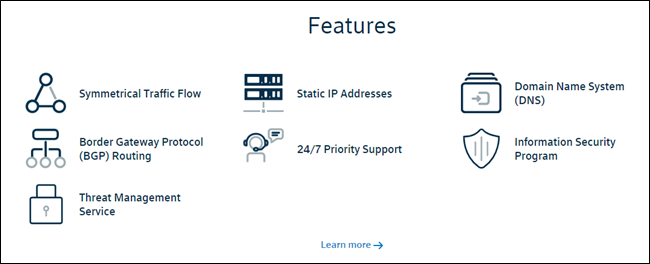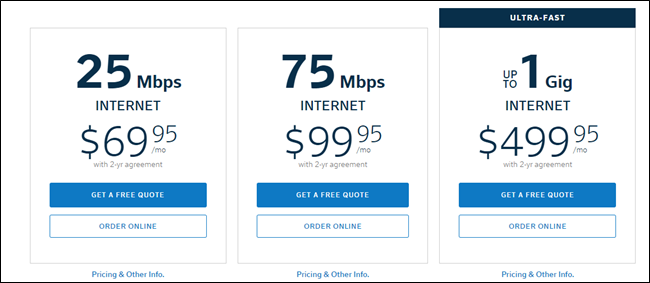Quick Links
Most ISPs offer business internet plans that cost a bit more, but also offer great features like no throttling, no data caps, and even higher speeds. And the chances are that you can get business internet in your home, whether you actually have a business or not.
What is "Business" Internet and How is It Different than "Home"?
There are some key things that set business internet plans apart from home internet, and if you rely heavily on the internet in your everyday life, you may want to consider making the switch. Like with anything, there are pros and cons. Let's start with the good stuff.
Pro: Faster Speeds (And Usually No Throttling or Data Caps)
Some ISPs offer higher internet speeds (especially upload speeds) for businesses than they do for residential accounts. And that's just the beginning.
It's 2018, and at this point most ISPs are running metered networks for home service, meaning you get a certain amount of data you can use each month. If you go over that data cap, you get charged an overage. In the case of my provider, if you go over your data package three times, they automatically bump you up to the next package, costing you more money. For other ISPs, they might just charge you extra each month for what you use. And still others start throttling your speed when you reach your data cap.
But since businesses use more data (and also varying amounts) on a month-to-month basis, running a capped network doesn't make a lot of sense. Most business internet plans have no data cap.
So if you're sick of having to watch every gigabyte you download, plan your download days around your billing cycle, or anything else involved in avoiding data overages, a business plan may be for you.
Unlimited usage is arguably the biggest reason to consider a business plan over a home package, so if your home internet is already unlimited, a business plan may not be as enticing to you.
Pro: Better Support
When it comes to getting tech support from your ISP (for general network issues), it can be hit or miss on a home data plan. You could be waiting for ages and still just end up with a generic answer from a script-reading employee.
Support for business plans tends to be much better. In my case, the wait times are a fraction of what I've experienced in the past, and it feels like I'm talking to a real person who actually knows what they're talking about---not someone just reading off a prompt.
In a perfect world, this would be a non-issue, because you'd never have to call tech support. But we don't live in that world, so if having the best support you can get from your ISP is important, a business plan is a good solution.
Not only that, but the support in general is better. For example, I recently got an email to let me know my ISP would be doing some network upgrades in my area, so I could experience intermittent issues while the repairs are happening. Now when my 'net goes down for a few minutes, I know what's up. I never got anything like that when I was a home internet customer.
Pro: Static IP Addresses and Other Advanced Features
We're getting a little more into the weeds here, and these advanced features won't matter to most people. But, they might matter to you.
Business accounts are more likely to offer features like static IP addresses (important if you're running any kind of internet-connected server or you're telecommuting and your company requires a static IP for connecting). Most home packages don't offer this feature, because most home users don't need it. Or even know what it is.
Some ISPs also offer additional features for business plans, like a domain name and space for building your own web site or running an email server.
Con: Generally More Expensive
You didn't expect to get all this good stuff for free did you? Good, because the majority of ISPs jack the price up (sometimes quite a bit) for business plans. It's the biggest---and perhaps only---drawback of going with a business plan.
So before you make the leap, take a close look at the packages and what you get with each. For example, if all you're looking to do is get away from data caps but it's going to cost you double what you pay for a metered package, then it may make more sense to just bump up to a larger package or pay for unlimited data if your ISP offers it.
Con: Service Contracts
Most of the time you can sign up for a home internet plan without having to sign any sort of agreement (unless you opt into some kind of deal that nets you a discount for a year or similar). Business plans don't generally work that way.
Most of the time, business plans require a one- or even two-year agreement to use, which may be a longer commitment than you want to make. Sometimes there is a trade-off, however---you may get a better rate for signing a longer contract. It all depends on how your ISP handles these matters, but it's something to consider.
How to Switch to a Business Plan
Signing up for a business plan is usually much like signing up for a residential plan, though sometimes you have to jump through a few extra hoops. Some ISPs place more restrictions than others on who can use business accounts. And some even limit business accounts to specific geographic areas.
That said, you usually can sign up for business internet at your home. A lot of people either telecommute or run their businesses from their home, and ISPs do cater their business plans to those people. At least, that's the case with the major providers we looked into, including Comcast, AT&T, Spectrum, and Verizon.
That said, you'll need to check with your provider (or other providers in your area) to see if they provide business internet at your address, and if they have any restrictions on who can apply. And unfortunately, the rules often seem to change on an area-by-area (and sometimes even case-by-case) basis.
Anecdotally, we've heard from people who were able to get business internet with no problem, others who were asked for information like a business name and federal tax ID number (though you can use a social security number instead if you're a sole proprietor), and still others who claim they were required to present an actual business license.
Our feeling, though, is that ISPs have become more accommodating to providing business class internet at residential locations over recent years. And why not? After all, the work-from-home types represent a pretty large workforce these days, so why not sell them your services?
You may also be able to circumvent some of these qualifications (if you run into them) by talking with your ISP's local rep. When you call the company, it usually goes to a general call center, where they don't know anything about you (or even care). But if you can hit up a local office and speak with the local business representative, then you may be able to swing a change to a business plan with less hassle. Again, it all just depends on your location and your ISP.
Still, it's worth looking into. Even at the higher price, the pros of business class internet often outweigh the cons.
Image Credit: PopTika/Shutterstock.com





